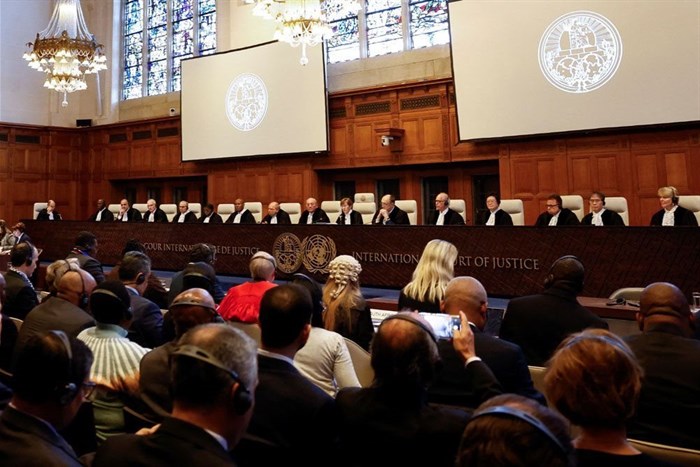The World Court on Friday ordered Israel to take action to prevent acts of genocide as it wages war against Hamas militants in the Gaza Strip, but it stopped short of calling for an immediate ceasefire.

Judges at the International Court of Justice (ICJ) rule on emergency measures against Israel following accusations by South Africa that the Israeli military operation in Gaza is a state-led genocide, in The Hague, Netherlands, 26 January 2024. Reuters/Piroschka van de Wouw
Ruling on a case brought by South Africa, the court said Israel must ensure its forces did not commit genocide and take measures to improve the humanitarian situation for Palestinian civilians in the enclave.
Majority rule for emergency measures
In the ruling, 15 of the 17 judges on the International Court of Justice (ICJ) panel voted for emergency measures which covered most of what South Africa asked for, with the notable exception of ordering a halt to Israeli military action in Gaza.
Israel's military operation has laid waste to much of the densely populated enclave and killed more than 25,000 Palestinians in nearly four months, according to Gaza health authorities.
Israel unleashed its assault after a cross-border rampage on 7 October 2023 by Hamas militants. Israeli officials said 1,200 people were killed, mostly civilians, and 240 taken hostage.
The court said it was "gravely concerned" about the fate of the hostages in Gaza and called on Hamas and other armed groups to immediately release them without conditions.
But the ruling, welcomed by Palestinians, will still be an embarrassment for Israel and its closest allies, including the United States.
Bhargav Acharya and Nellie Peyton 26 Jan 2024
Israel had asked the court to reject the case outright, saying it respects international law and has a right to defend itself.
"The state of Israel shall...take all measures within its power to prevent the commission of all acts within the scope of Article II of the Genocide convention," the court said.
Israel must report back to it on what steps it was taking in a month's time, it said.
Israeli Prime Minister Benjamin Netanyahu said the charge of genocide leveled against Israel was "outrageous" and said it would do whatever is necessary to defend itself.
"The vile attempt to deny Israel this fundamental right is blatant discrimination against the Jewish state, and it was justly rejected," he said in a statement.
But while the ICJ's decisions are final and without appeal, the court has no way to enforce them.
Question of genocide
The court did not rule at this stage on the core of the case brought by South Africa - whether genocide has occurred in Gaza. But it recognised the right of Palestinians in Gaza to be protected from acts of genocide.
South Africa's deputy president Paul Mashatile and Justice Minister Ronald Lamola were seen cheering and dancing at a gathering of the governing African National Congress party following the court's verdict.
South Africa argued two weeks ago that Israel's aerial and ground offensive was aimed to bring about "the destruction of the population" of Gaza.
The 1948 Genocide Convention, enacted in the wake of the mass murder of Jews in the Nazi Holocaust, defines genocide as "acts committed with intent to destroy, in whole or in part, a national, ethnical, racial or religious group".
Acts of genocide named in the convention include killing members of the group, causing serious bodily or mental harm to members of the group and deliberately inflicting conditions of life calculated to bring about the destruction of the group in whole or in part.






























